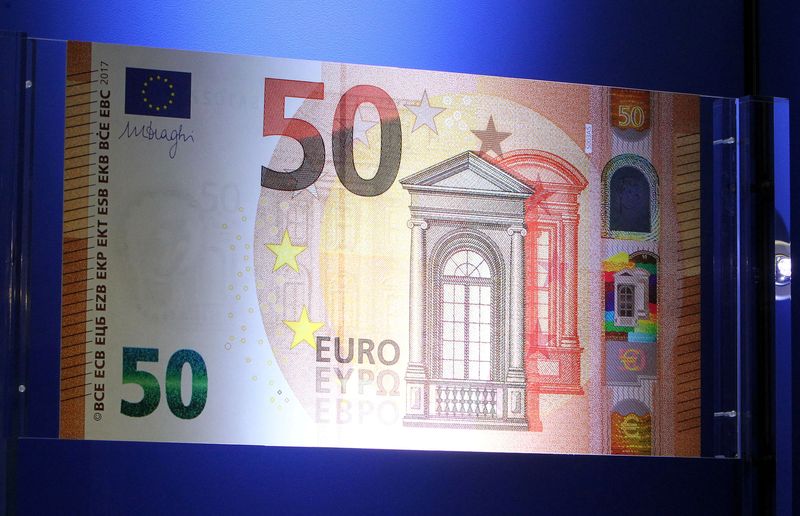

© Reuters. FILE PHOTO: The European Central Bank (ECB) presents the new 50 euro note at the bank’s headquarters in Frankfurt, Germany, July 5, 2016. REUTERS/Ralph Orlowski/File Photo
2/2
By Sinead Cruise and Alexander Marrow
LONDON (Reuters) -Some western banks are lobbying against EU proposals to redistribute billions of euros in interest earned on frozen Russian assets, senior industry sources said, fearing it could lead to costly litigation.
European Union leaders on Thursday agreed to move ahead with work on a plan to use up to 3 billion euros ($3.3 billion) a year to supply arms to Ukraine as they try to bolster Kyiv’s fight against Russia, which would still own the underlying frozen assets. EU leaders said the proceeds could be used within a few months.
Some banks fear, however, that they might later be held liable by Russia if they are involved in any transfer of money to Ukraine and that the EU plan could be extended to assets in accounts they hold for sanctioned individuals and companies.
Such an extension has not yet been raised by the EU.
The sources are also concerned that the proposals will lead to a wider erosion of trust in the western banking system.
The sources, who declined to be named due to the sensitivity of the matter, said they were sharing their concerns with British and euro zone policymakers, flagging likely litigation when anti-Russian sanctions are eventually eased or lifted.
Russia says any attempt to take its capital or interest is “banditry” that will lead to decades of legal action against all those involved. Moscow has repeatedly said it will retaliate if its assets or income are expropriated.
Euroclear holds the equivalent of 190 billion euros of Russian central bank securities and cash. Western banks also hold billions of euros, pounds and dollars in assets owned by companies and individuals subject to sanctions.
More than 3.5 million Russians have frozen assets abroad worth around 1.5 trillion roubles ($16.32 billion), Russia’s Finance Minister Anton Siluanov said last year.
The EU plan envisages paying a fee to Euroclear, which did not respond to a request for comment.
The Belgium-based central securities depository, which counts some of the world’s largest banks as shareholders, will also be permitted to temporarily retain 10% of the profits on stranded Russian assets as a safeguard against litigation.
Under the EU plan, some 90% of the seized cash would be channelled through the European Peace Facility to buy arms for Ukraine. The rest will be used for recovery and reconstruction.
EU, English and U.S. sanctions law typically provides for freezing assets owned by designated parties, but not confiscation. Assets can be confiscated under English law, but only if ruled to be the proceeds of crime.
Permitting the confiscation and redistribution of interest earned on those assets puts banks at risk of being challenged by owners, the sources said.
One source warned of the precedent this proposal would set and the “weaponisation of foreign-held reserves and assets”.
Russia itself has seized assets, installed new management at Western companies’ subsidiaries and forced departing firms to sell at huge discounts in response to Western sanctions.
A second person said their bank was seeking legal advice on indemnities it could demand to participate in the EU’s plan.
“If these proposals move forward, the whole legal architecture would need to change,” said Paul Feldberg, partner and head of Brown Rudnick’s White Collar Defense, Investigations & Compliance practice in London.
“As far as banks go, I think they’re right to be concerned because we have already seen huge amounts of civil litigation in relation to sanctions,” said Feldberg, who is not currently directly involved in any lobbying.
REPUTATION
Moscow says that any confiscation would be a blow to property rights, harm confidence in Western bonds and currencies and torpedo trust between central banks.
Kremlin spokesman Dmitry Peskov this week said the EU proposal would undermine international law and warned of inevitable damage to Europe and decades of legal wrangling.
“The Europeans are well aware of the damage such decisions can cause to their economy and to their image, their reputation as a reliable, so to speak, guarantor of the inviolability of property,” Peskov told reporters.
Francis Bond, senior associate at law firm Macfarlanes said the detail on the EU proposal was crucial when gauging the likelihood of prolonged international legal disputes.
“…this proposal is not going to represent the end of this story but more likely the latest salvo in a perennial debate about the nature of sanctions and their appropriate role in the global financial system,” he said.
The European Commission did not respond to a request for comment. Britain’s finance ministry deferred comment to the UK Foreign, Commonwealth and Development Office.
The FCDO said British Foreign Secretary David Cameron had addressed the issue in a debate on March 5 in which he said: “The moral case is there — this money should be used for the benefit of the Ukrainian people”.
‘CLAWBACK’
It is not yet clear how many EU member states will support the EU proposals or how quickly they could be implemented.
In the meantime, lawyers examining them said indemnities would not necessarily neutralise potential litigants.
“There isn’t an immediately obvious way for banks to insulate themselves comprehensively from future challenges and clawback actions,” Oliver Browne, litigation and arbitration partner at Paul Hastings, told Reuters.
“Prudent financial institutions need to anticipate the likely future costs of the inevitable disputes that will come,” said Browne, who is not lobbying directly but is talking with clients who might be impacted by changes to sanctions law.
A third industry source said the potential confiscations had compounded worries among bankers about their compliance with sanctions, including navigating any possible misalignment between the EU, Britain and the United States.
($1 = 91.8955 roubles)
($1 = 0.9196 euros)






